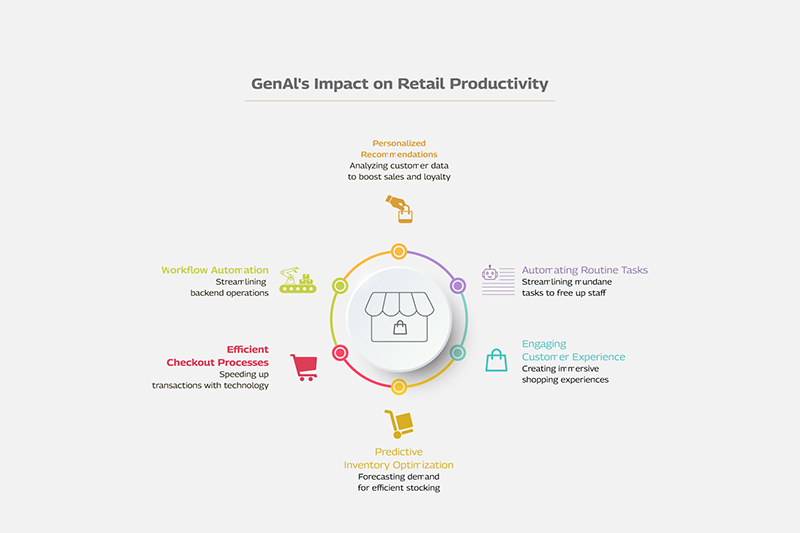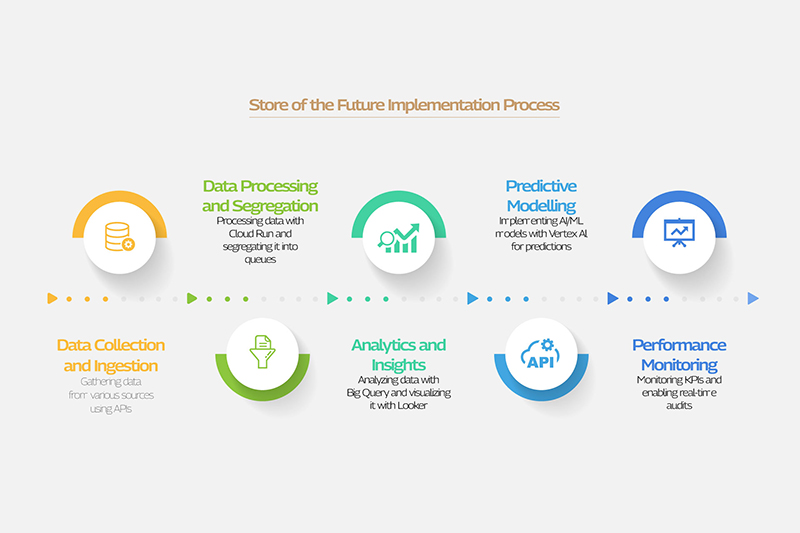From Clicks to Bricks: GenAI Drives a New Era in Retail

Picture this: It’s 2030. You pause Netflix to buy a character’s outfit with a tap, and it turns out it’s your favorite brand! While you could have tried it on virtually, you decide to visit the store, where a stylist awaits with that outfit and similar alternatives. As you leave, AI handles checkout. What once felt like an errand is now an immersive, personalized experience.
This level of seamless, hyper-personalized shopping is already unfolding and powered by AI. McKinsey’s 2023 report, The Economic Potential of Generative AI: The Next Productivity Frontier, states that GenAI will unlock between $240 billion and $390 billion for retailers.
The store of 2030 is no longer a mere vision - it is here!
Key Trends in Action
To capitalize on this opportunity, brands are reimagining the entire retail ecosystem, driven by evolving customer needs. The lines between physical and digital retail are fading, creating a seamless, connected shopping experience. This transformation is accelerating, with key trends shaping the modern retail landscape:
- Wait Time for Assistance and Checkout: Consumers demand swift yet hyper-personalized service. Electronic Shelf Labels (ESLs), smart shelves, and self-checkout systems reduce wait times by providing real-time product information and enabling independent purchases.
- Seamless Omnichannel: Shoppers expect a unified journey. Buy Online, Pickup In-Store (BOPIS), and Buy Online, Return In Store (BORIS) are now standard, making returns easier and shopping more flexible.
- Autonomous Stores: Amazon Go popularized cashier-less, ‘grab-and-go’ stores, a concept now gaining traction. These stores use computer vision, deep learning, and sensor fusion technologies to eliminate traditional checkout processes.
- Sustainability: As consumers become more environmentally conscious, retailers embrace energy-efficient stores, recyclable packaging, and initiatives to reduce their carbon footprint.
- Experiential Retail: With millennials favoring experiences, retailers create immersive environments with interactive displays, personalized services, and unique events. According to market research firm UnivDatos Market Insights, this market is projected to reach $297.89 billion by 2032
- Delivery Time: Consumers expect same-day or on-demand delivery, driving logistics and supply chain optimization investments.
- Real-Time Assistance: Shoppers need instant access to information and support. AI-powered assistants, chatbots, and in-store staff provide real-time assistance, stock updates, and product recommendations.
The Role of GenAI in Transforming Store Productivity
GenAI is emerging as a game-changer, revolutionizing how retailers engage customers, meet their evolving needs, and optimize operations for unprecedented productivity gains. Here’s how:
- Personalized Recommendations: GenAI analyzes customer data (purchase history, behavior, and browsing patterns) to deliver tailored suggestions, boosting sales and loyalty. Reports show that 66% of customers are willing to try new products based on AI-driven recommendations3.
- Predictive Inventory Optimization: GenAI forecasts product demand using customer data and sales trends, enabling real-time stocking decisions and improving supply chain efficiency.
- Automating Routine Tasks: From stock monitoring and order fulfillment to customer inquiries, AI-powered chatbots and automation tools handle mundane tasks, freeing employees to focus on complex issues.
- Enhanced Shopping Experiences: GenAI enables immersive shopping through virtual try-ons, AI styling, and interactive displays. Adidas’ Ozworld, for example, uses GenAI to create personalized avatars based on users’ personalities and shoe preferences, boosting engagement across 1,500+ metaverse apps.
- Efficient, Data-Driven Checkout Processes: GenAI powers cashier-less systems, smart carts, and AI-driven self-checkout, speeding up transactions. Machine learning and computer vision detect suspicious behavior, prevent errors, and secure the checkout experience.
- Workflow Automation: GenAI streamlines backend operations by automating task assignments, monitoring performance, and optimizing workflows.
- Workforce Management: AI-powered tools optimize workforce scheduling, predict staffing needs, and provide personalized training, enhancing employee productivity.
- Loyalty Programs: GenAI helps retailers personalize rewards, loyalty programs, and targeted campaigns to drive engagement and retention.
- Experiential Virtual Retail: AI-powered virtual stores offer tailored experiences, making digital shopping more interactive and engaging.
-
Autonomous Retail – The Rise of Self-Operating Stores: GenAI enables fully autonomous stores, with AI and computer vision, to manage inventory, assist customers, track movements, identify products, and process transactions seamlessly.

Navigating the GenAI Retail Revolution: Hurdles to Adoption
While the transformative potential of GenAI in retail is undeniable, several challenges hinder its widespread adoption:
- Infrastructure Costs: Implementing GenAI requires significant investment in hardware, software, and network capabilities, which can be a substantial burden for small and medium-sized retailers.
- Integration Complexity: Integrating GenAI with legacy retail systems is complicated by data quality issues and the lack of a unified customer view. Many retailers struggle to consolidate siloed data, limiting the effectiveness of GenAI models.
- Ethical Considerations and Trust: GenAI raises ethical concerns, including risks of bias, hallucinations, and harmful AI outputs. Missteps in AI-driven interactions can damage brand reputation and erode customer trust.
- Data Security and Privacy: GenAI relies on vast amounts of consumer data, raising concerns about security, privacy, and compliance. The potential for data breaches and unauthorized access to personal information poses significant risks.
Simplifying GenAI Adoption for Retail Success
Seven of the top 10 global retailers trust Tech Mahindra to navigate the complexities of GenAI implementation. Here’s how we empower our customers to succeed:
Case 1: An American Retail Company
| Challenges Addressed | Tech M’s Approach | Key Results |
|
Marketplace Enablement and Planogram Optimization:
|
|
Case 2: A Multinational Beverage and Brewing Company
| Challenges Addressed | Tech M’s Approach | Key Results |
|
Store-as-a-Medium (SaaM) and IoT Integration:
|
|
Case 3: A French Luxury-Goods Conglomerate
| Challenges Addressed | Tech M’s Approach | Key Results |
|
Omnichannel Experience and Fulfillment Optimization:
|
|
Case 4: Finnish Retailer Department Stores having more than 17mn visitors every year
| Challenges Addressed | Tech M’s Approach | Key Results |
|
Digital Transformation and Personalized Engagement:
|
|
Tech Mahindra's Store of the Future: Leveraging Technology for Success
Tech Mahindra understands the challenges retailers face in adopting GenAI, managing data silos, and enhancing customer experiences. Their Store of Future solution is designed to create seamless customer journeys, boost engagement, ensure inventory accuracy, and drive sales. Here’s how:
- Seamless Omnichannel Experience: Built on Google Cloud’s Apigee, Google Kubernetes Engine (GKE), and Cloud Run, our solution enables a unified, scalable infrastructure, ensuring a connected customer journey across all touchpoints.
- Robust Network Connectivity: Powered by radio-frequency identification (RFID), Bluetooth, and Wi-Fi, it provides secure and reliable real-time data flow.
- In-store marketing and Hyper-Personalization: AI-driven insights help retailers create engaging, targeted campaigns based on customer preferences, enhancing in-store experiences.
- Efficient Inventory Management: RFID, rovers, and robotics improve inventory tracking, stock accuracy, and personalized pricing and promotions.
- Customer-centric Store Design: Smart mirrors and interactive trial rooms enhance store layouts and elevate the shopping experience.
- Advanced Video Analytics: AI-powered video analytics track customer behavior, optimize layouts, and prevent theft, enabling data-driven decisions.
- Frictionless Checkout: Cloud-based POS systems with self-checkout reduce wait times, improve inventory accuracy, and enhance customer satisfaction.
- Accelerated Product Development: Integrated tools streamline innovation, reducing time to market for new products.
Implementation: A Data-Driven, Collaborative, and Agile Approach
Leveraging Google Cloud, Tech Mahindra follows a structured, data-driven approach to implementing the Store of Future:
-
Data Collection and Ingestion
- Data is gathered from showrooms, warehouses, online sales platforms, and master data management systems.
- Application programming interface (APIs) ensure seamless data capture across multiple sources, processed through a load-balanced API Gateway.
-
Data Processing and Segregation
- Google Cloud Run processes and channels ingested data.
- Data is organized into message queues to generate tailored data marts for different business needs.
-
Analytics and Insights
- BigQuery analyzes purchase patterns, SKU performance, and customer preferences.
- Looker dashboards provide real-time insights into customer behavior and business performance.
- BI Engine and In-Memory Vectorization accelerate analytical queries.
-
Predictive Modeling
-
Vertex AI implements advanced AI/ML models, including:
- AI for personalized product suggestions
- Cloud Vision API for AI-powered video analytics (e.g., store traffic, shopper demographics, and planogram compliance)
- Unified inventory view APIs enable seamless marketplace integration.
-
Vertex AI implements advanced AI/ML models, including:
-
Performance Monitoring
- Key performance indicators (KPIs), such as ROI and productivity gains, are continuously tracked.
- Real-time insights enable personalized marketing, optimized inventory control, and dynamic pricing strategies.
Tech Mahindra is helping retailers bring their futuristic store to life through this data-driven, AI-powered transformation, delivering efficiency, personalization, and seamless experiences at scale.

Conclusion
GenAI presents a remarkable opportunity for retailers to enhance productivity and redefine customer experiences. However, unlocking its complete potential demands a robust strategy, seamless integration, and the right technology foundation. With deep industry expertise and its innovative Store of the Future solution, Tech Mahindra empowers retailers to navigate this transformation confidently.
Let’s shape the future of retail—together.
End Notes
- (2023, June). The economic potential of generative AI: The next productivity frontier. McKinsey.
- (2024, November). Experiential Retail Market: Current Analysis and Forecast (2024-2032). Univdatos Market Insights.
- How GenAI transforms customer experiences with personalized product recommendations. Sigmoid.

As a seasoned technology leader, Krishnakumari Palle (KK) drives business transformation, IT outsourcing, and multi-service integration for Fortune 500 clients across industries and geographies. She has led large-scale global engagements, overseeing P&L management, high-performance team building, and automation-driven initiatives.
MoreAs a seasoned technology leader, Krishnakumari Palle (KK) drives business transformation, IT outsourcing, and multi-service integration for Fortune 500 clients across industries and geographies. She has led large-scale global engagements, overseeing P&L management, high-performance team building, and automation-driven initiatives.
KK also serves on the Board of Directors for Satyam Venture Engineering Services, Mahindra University, and Altavec, actively mentors women in technology, and supports NGOs for girls' education. With over 24 years of expertise, she fosters innovation and drives business growth. KK holds an M.S. from BITS Pilani, a B.Tech from NIT Warangal, and multiple leadership certifications.
Less







